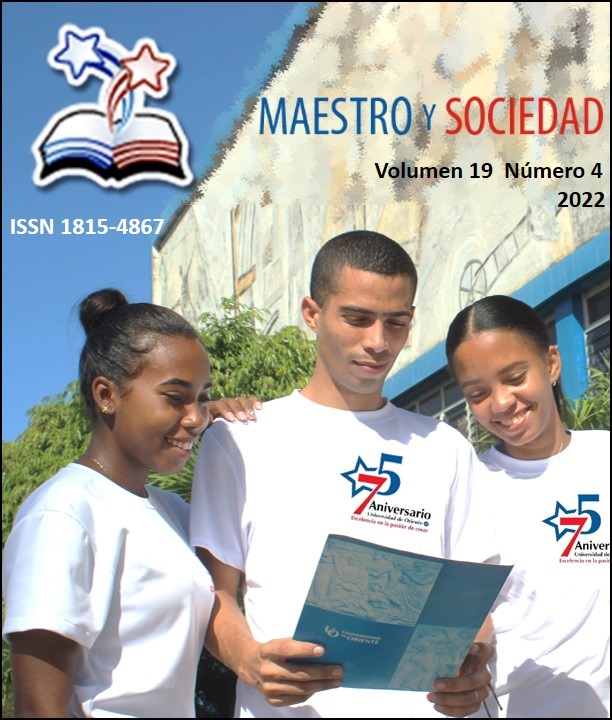Estrategia para formación de profesionales de educación en la atención de deficientes auditivos incluidos
Strategy for professionals´ of education training in the care of the hearing impaired children included
Palavras-chave:
Inclusión educativa, atención psicopedagógica, formación profesional, Educational inclusion, pshyco-pedagogical care, professional trainingResumo
Las exigencias del proceso de tránsito, en la educación especial determina que los niños deficientes auditivos, transitan a la enseñanza general al concluir el sexto grado, necesitando una atención psicopedagógica que responda a sus necesidades educativas individuales, el análisis de la marcha del proceso revela la existencia de profesionales recién graduados que manifiestan la falta de preparación para trabajar con este tipo de alumnado. El trabajo tiene como objetivo socializar una estrategia para la formación de profesionales de educación. Durante la etapa de preparación para el empleo se utilizan como métodos el análisis y síntesis para la valoración de documentos relacionados con el tema y la modelación que permitió diseñar la propuesta de la estrategia pedagógica que se aporta. La misma favorece la preparación de los profesionales para la atención educativa del deficiente auditivo incluido.
The demands of the transition process in special education determine that hearing impaired children transition to general education at the end of the sixth grade, needing psycho- pedagogical care that responds to their individual educational needs, the analysis of the progress of the process reveals the existence of recently graduated professionals who show a lack of preparation to work with this type of student. The work aims to socialize a strategy for professionals´ of education training during the stage of preparation for employment, as methods were used analysis and synthesis for the evaluation of documents related to the subject and the modeling that allowed the design of the proposed pedagogical strategy that is provided. It favors the preparation of professionals for the educational care of the hearing impaired included.
Referências
Argota-Pérez, G., et al. (2020). Formación investigativa parael aprendizaje prospectivo y metodológico en estudiantes universitarios. http://revistas.urp.edu.pe/index.php/Paideia/article/view/3442
Arnaiz, P. (2004). La educación inclusiva: dilemas y desafíos. Educación, desarrollo y diversidad, 2 (7),
Borges, R. S. y Orozco, M. M. (2013). Educación Especial y Educación Inclusiva. Un Horizonte singular y diverso para igualar las oportunidades de desarrollo. Pedagogía 2013. Ministerio de Educación.
De Tezanos, A. (2007).Formación de profesores: Una reflexión y una propuesta. Revista Pensamiento Educativo, 41(2), 57-75.
Ferry, G. (1997). La formación del estudiante universitario. Revista Universidad–Sociedad 2.
Mafran, Y. (2019). La formación de la competencia orientadora en estudiantes de carreras pedagógicas. [Tesis de doctorado, Universidad de Oriente].
Mutaza, D., Méndez, D. y Basto, M. (2022). Formación del docente: mirada interdisciplinaria en la integración en el accionar pedagógico profesional. https://maestroysociedad.uo.edu.cu
Olivares, P., Travieso, R., González, G. y Novo, R. (2021). La actuación profesional como dimensión de la profesionalización docente en la Educación Médica. Maestro y Sociedad, 18(3), 848-859. https://maestroysociedad.uo.edu.cu
ONU. (2015). Agenda 2030 para el desarrollo Sostenible. https://www.un.org/sustainabledevelopment/es/education/
Paz, I. M. y Gámez, E. (2017). Reflexiones y aportaciones en torno a la formación como categoría pedagógica. [Cd-Room]. II Convención Internacional de Ciencias Sociales y Ambientales.
Vaillant, D. (2013). Formación inicial del profesorado en América Latina: Dilemas centrales y perspectivas. Revista Española de Educación Comparada, (22), 185-206.
Walter, V. Asanza, L., Olivares, G. y Rodríguez, V. (2022). Estrategia didáctica para la formación profesional del Tecnólogo de Imagenología y Radiofísica Médica desde la asignatura Matemática Aplicada. https://maestroysociedad.uo.edu.cu
Publicado
Como Citar
Edição
Seção
Licença
Copyright (c) 2022 Mayelin Comas-Garrido, Nuris Avila Saint-Felix, Félix Lázaro Huepp-Ramos

Este trabalho está licenciado sob uma licença Creative Commons Attribution-NonCommercial-NoDerivatives 4.0 International License.
Esta revista proporciona un acceso abierto inmediato a su contenido, basado en el principio de que ofrecer al público un acceso libre a las investigaciones ayuda a un mayor intercambio global de conocimiento. Cada autor es responsable del contenido de cada uno de sus artículos. Los artículos pueden ser inéditos o estar disponibles previamente en servidores de preprints reconocidos por la revista. Sin embargo, no se permite la duplicación de la publicación o traducción de un artículo ya publicado en otra revista o como capítulo de un libro.
This journal provides immediate open access to its content, based on the principle that providing the public with free access to research supports a greater global exchange of knowledge. Each author is responsible for the content of each of their articles. Articles may be previously unpublished or available on preprint servers recognized by the journal. However, duplication of publication or translation of an article already published in another journal or as a book chapter is not permitted.
Esta revista oferece acesso aberto imediato ao seu conteúdo, com base no princípio de que oferecer ao público acesso gratuito à pesquisa contribui para um maior intercâmbio global de conhecimento. Cada autor é responsável pelo conteúdo de cada um de seus artigos. Os artigos poderão ser inéditos ou estar previamente disponíveis em servidores de preprints reconhecidos pela revista. No entanto, não é permitida a duplicação de publicação ou tradução de artigo já publicado em outro periódico ou como capítulo de livro.



























 Universidad de Oriente
Universidad de Oriente 